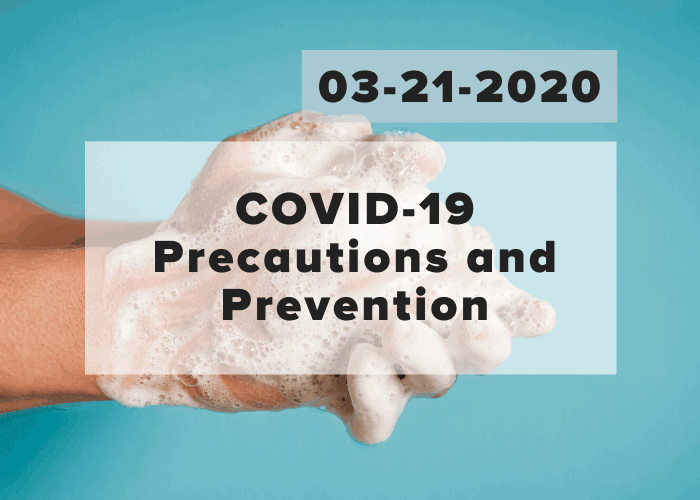Now, I want to do an update on precautions and prevention. Obviously we’ve all heard about the 20 second hand washing a million times by now and that is very, very, very true. Good hand washing with soap and water is one of the best defenses that you can have. The recommendation is to use soap and water. If you cannot find soap and water then hand sanitizer is second best and obviously you know hand sanitizers on huge shortage of supply right now.
Another thing you can do, when using your own cleaning products at home, if you can choose products that are both effective and more nontoxic. And so that is 70% or greater alcohol and hydrogen peroxide, also. Those are two less damaging, less toxic products to use that are still effective in killing the virus. I know that alcohol is out of stock pretty much everywhere right now, but that will eventually come back into stock, also.
Now I want to address the situation with masks because there’s some mixed information out there on masks, both the prevention and transmission of the Coronavirus. So here is what we definitely know. So we know that the N95 respirators, which are the hospital grade respirators, we do know that for someone who is asymptomatic, meaning someone who does not have the disease, that it does help prevent them from getting the disease. On the surgical mask, just the regular, paper looking surgical masks, we’re unsure really if that helps the asymptomatic person-prevents them from getting it. Now how it might help potentially is if you know how to actually put the mask on and there’s a good fit at the bridge of the nose and you keep your hands away from your face, away from actually fidgeting with the mask. And if you don’t assume that just because you’re wearing that mask, you’re not going to get it and still take the social distancing precautions. Stay at least six feet from the person in front of you and in a line if you’re out in public, and so on and so forth.
And then of course because there’s a shortage of N95s and surgical masks, a lot of people are making a homemade mask, which can be really great. But again, it’s not studied and so we don’t really know if it’s going to help prevent you as the asymptomatic person from getting it. But again, if you wanted to take extra precautions, it’s something that’s not going to be harmful, maybe potentially helpful. I would just really caution as I did in previous videos about not monkeying with the mask or touching your face too much still, even though you have a mask on. The concern is that people that aren’t used to wearing masks are going to itch their face because some of the materials can be a little bit irritating to the skin, and you may actually increase your risk when you think you’re decreasing it. So as long as you know how to use it properly, it may be potentially helpful and it’s not harmful. That’s how I would look at it.
And just a general note. Obviously all of these things are on very short supply. Even health care workers currently are having shortages of the N95s and the surgical masks. And so out in the community they’re very, very low stock. So you may be wearing a homemade mask version, let’s say. But I will say if you get sick yourself or a family member, you’re taking care of someone that is sick, I would really highly encourage those people, the sick people to definitely put a mask on when they’re interacting with anyone.
And obviously you want to keep interactions as low as you can, but the person that is sick, that you might be helping take care of, you want to protect yourself as a healthy person. I would definitely wear a mask in that situation and for sure the sick person should have a mask on when they’re interacting with you.
So I hope that helps clear up a little bit on what the current status is of precautions.

